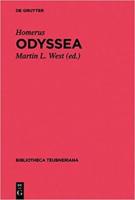
De Gruyter/Teubner (2017) h/b pp.lii + 519 £81.99 (ISBN 9783110425390)
This brief notice (it is not a review) does no more than draw readers’ attention to the last work of scholarship to come from the late Martin West, and it follows his edition of the Iliad (1998-2000), also for Teubner.
In the Praefatio (entirely, of course, in Latin), W. reminds us that in his The Making of the Odyssey (2014) he had sought to establish that the Odyssey was composed not in Ionia but in Greece, possibly in Euboea or Attica—hence Atticicisms should not be expelled ‘nimis curiose’ from the text: and, as in Iliad, the relevance of Didymus as ‘against’ Aristarchus is given some stress. He goes on briefly to discuss the MS tradition and the papyri (of which there are 566 in all, mostly not yet edited). W. has also assembled the testimonia on a generous scale. The old OCT edition of T.S. Allen (1917-19) is dismissed as ‘paene inutilis’, since Allen’s ‘families’ of MSS are non-existent. The edition of H. van Thiel (1991) is censured for having a ‘nimis angustum…apparatum’ and for inadequate attention to the readings of papyri, but he is praised for simplifying Allen’s sigla. W. regards eight MSS as being almost always sufficient to establish the most likely readings, and these he had himself collated ‘per imagines’, and constantly refers to them in his apparatus criticus.
W. goes on to list and describe the numerous ‘testes’ whom he uses, dividing them by dates (comprising five from the 10th and 11th centuries; six from the twelfth to fourteenth centuries; sixteen of the Byzantine twelfth century witnesses; and finally some minor sources). A long and detailed section of orthographica follows. The Praefatio is concluded by a note from Stephanie West, who did what was necessary to complete the work after the sudden death of her husband. In the following 26 pages there come explanations of the sigla breviata, including a list of 557 papyri, glossaria, commentarii, scholia minora, certain specialist papyri and inscriptions, grammatici, the eight MSS ‘constanter citati’, other MSS ‘raro citati’, miscellaneous sigla, chief editions (17 are listed), and ‘opera compendiosius laudata’. The text follows, with an Index Nominum.
This is an edition by a scholar for other scholars and it will receive the full notices that it deserves in the appropriate Journals. The reviewer closes by observing that he has little doubt that it will be regarded as representing a more than worthy final contribution to the substantial and distinguished body of work from a great scholar, who broadened and deepened our knowledge of the world of Ancient Greece in many ways. In his contribution to Hesperos, the Festschrift offered to W. on his 70th birthday, the late Walter Burkert noted that W. had written on over a hundred Greek authors in ‘rebuilding the foundations of Greek poetry from Homer and Hesiod … to Aeschylus’.
W.’s Iliad received reviews of great length by G. Nagy and J-F Nardelli. W.’s long and authoritative reply to their criticisms in BMCR (2001.09.06) demonstrates both his methods and his mastery. It should be read.
Colin Leach
